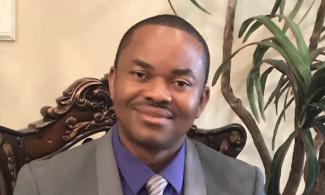A tale of two Mahsas, choice and the Iranian uprising, by Osmund Agbo
Few weeks ago, I met a young woman of Iranian descent who had come for an elective hospital subspecialty rotation in our department. As with Mahsa and others that came before her, this has become more or less, a right of passage for most medical residents, in fulfillment of their pre-graduation academic requirements.
I have always struggled to pronounce Iranian names correctly. As a medical resident in New York a couple of years ago, Pedram, a Persian who was both a friend as well as a classmate would have a good laugh each time I sounded out the name of his country’s president. Iran’s president at the time happened to be Mahmoud Ahmadinejad. In Mahsa’s case, I was smart enough to quickly tie her name to another easier-to-remember name; Mansa (as in Mansa Musa of the famous Mali Empire) but without an “n”, as a way to commit to memory. But for sure, Persian, known to its native Iranian speakers as Farsi and spoken in modern-day Iran, parts of Afghanistan, and the central Asian republic of Tajikistan is not for the faint-hearted.
Mahsa is an American citizen born to Iranian parents who fled the country in the wake of the Islamic revolution of 1979. Following the fall of the US-backed autocrat and Shah of Iran, Mohammed Reza Pahlavi in February of that year, many ecstatic Iranians danced in the streets as Grand Ayatollah Ruhollah Khomeini, the godfather of the revolution, returned from exile in Paris. An Islamic republic, a theocracy built on ideological choices inspired by the Grand Ayatollah was born. New rules were put in place with strict adherence to the Islamic sharia laws.
The whole idea was to forbid anything that might lead one astray and prevent one from making heaven. And that means total segregation of the sexes in public places; compulsory head scarves for women; bans on alcohol and musical instruments on television. Under such rules, women are forbidden from riding bicycles. Iran’s mandatory hijab law went into effect in 1981. These rules were brutally enforced by the morality police and the paramilitary Basij forces. As time went on, restrictions and trampling on individual rights got worse. It was under those circumstances that Mahsa’s father fled Iran and settled in a new country in North America: The United States.
In one of those moments after hospital rounds, I asked Mahsa what her thoughts were about Iran, her ancestral homeland. She told me that she hadn’t visited the country and had no intention of doing so whatsoever. On the issue of religion, she self-identifies as agnostic. She finds it distasteful the way the country is being run by the Mullahs who, according to her, show no regard for individual freedom and treat women more or less, like a piece of property. Little did I know that her concern would play out in the fate of another Mahsa, just a few weeks after.
If you have been following the news lately, you may have heard of Mahsa Amini, the 22-year-old beautiful Iranian lady whose death in the hands of the Islamic nation’s morality police is threatening the very foundation of one of the world’s most enduring theocracies.
Last Tuesday, Mahsa who also went by the name Jina was visiting the nation’s capital of Tehran with her family from the city of Saqiz in Kurdistan province. According to a source, as she exited the subway with her brother, she was arrested by the police and later detained for allegedly violating dress rules and thereby running afoul of Iran’s strict Hijab law.
The circumstances surrounding her death, like most things in the Islamic Republic, is shrouded in secrecy. In a statement issued by Iran’s security forces, they claimed that Ms Amini went into cardiac arrest while at the detention centre, receiving educational training on hijab rules, a claim that her family seriously disputed. His brother who had camped out at the centre waiting for her sister to be released stated that a witness told him how security forces had killed a young woman inside. Next thing you know, an ambulance pulled up and took the young lady to the hospital where she was pronounced dead shortly after. The regime tried hard to convince Iranians that a healthy 22-year-old girl with no past medical history, suddenly suffered a heart attack and died. But no one is buying that.
Pictures of Ms Amini widely circulating on social media two days following the arrest showed an unconscious young woman, lying on a hospital bed with tubes in her mouth and nose, blood oozing from her ear. Many Iranian physicians said through their Twitter handles that even though they had no access to her medical file, bleeding from the ear smacks of concussion injuries to the head, the type seen in those that suffered trauma. This was what sparked off a large-scale protest that is now threatening the old order with many chanting “death to the dictator” and “death to Khamenei,” referring to Iran’s supreme leader Ayatollah Ali Khamenei.
Many have not only condemned the apparent violence against Mahsa Amini but are demanding a total dismantling of the Iranian theocracy. The nationwide massive protest following her death is seen as a sign of defiance against the iron grip of one of the world’s most oppressive regimes. Her death is being likened to the case of Mohamed Bouazizi, the Tunisian fruit and vegetable seller whose self-immolation became a catalyst for the Tunisian Revolution and the wider Arab Spring against autocratic regimes.
In protesting the death of Ms Amini, thousands of Iranian women poured into the streets with their Hijab yanked off in one-of-a-kind defiance to the authorities. It’s a known fact that most women in Iran grew up wearing Hijab and so this is the only way they know how to dress up. These women are likely to cover up even without prompting as a choice but hate the idea of an executive order being shoved down their throat, especially by those who feel no obligation to cover theirs.
There is just something fundamental about choice that appeals to humankind universally. Take that way and the rebellious nature of man will manifest fully in its unpleasantness. Adults (and even children to a certain extent) hate being told what to do. Even when they are likely to go in one direction, they still find it comforting to know that other options exist in the unlikely event that they need to be considered. Whether it’s the Hisbah police in Kano enforcing an alcohol ban or the morality police in Iran mandating women to wear Hijab, for so many, it’s either “Give me liberty or give me death.”
So was Tunisia. Here goes Iran. Where is the next stop?
Dr Agbo, a Public Affairs Analyst is the coordinator of African Center for Transparency and Convener of Save Nigeria Project. Email: Eagleosmund@yahoo.com
Follow the Neptune Prime channel on WhatsApp:
Do you have breaking news, interview request, opinion, suggestion, or want your event covered? Email us at neptuneprime2233@gmail.com






